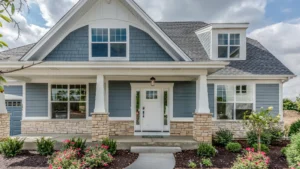The dream of owning a home in Canada feels increasingly distant for many. Prices in major cities like Toronto and Vancouver require large sums that many interested buyers can’t reach on their own. Fractional home ownership—where two or more parties jointly purchase and share a property—has emerged as a viable alternative for those willing to approach homeownership creatively.
This guide will walk you through everything you need to know about co-owning a home in Canada, whether you’re looking for a primary residence, an investment property, or a vacation home. We’ll cover:
- What Fractional Home Ownership Really Means – Breaking down the legal and financial structures
- The Benefits of Shared Ownership – Why this model is gaining popularity
- Potential Challenges & How to Avoid Them – Navigating conflicts and financing hurdles
- Government Programs That Can Help – Incentives for first-time buyers and investors
- Is Fractional Home Ownership Right for You? – Key questions to ask before committing
- How Our Real Estate Team Makes Co-Owning Easier – Expert guidance every step of the way
By the end of this guide, you’ll have a clear understanding of whether fractional home ownership aligns with your goals—and how to pursue it with confidence.
What Is Fractional Home Ownership?

Fractional ownership isn’t just about splitting costs—it’s a structured way for multiple parties to legally share property rights. Unlike timeshares (which grant limited usage rights), fractional ownership means you hold actual equity in the home.
How it Works Legally
In Canada, most arrangements fall under tenants-in-common agreements, where each owner’s percentage stake is documented (e.g., two buyers might split 50/50, while a group of four could divide shares unevenly based on investment size). This differs from joint tenancy, where ownership is automatically equal and surviving inheritors absorb a deceased owner’s share.
Common Use Cases for Fractional Home Ownership
- Purchasing Primary Residences: family members buy together to live in the home full-time. New generations are also more open to sharing a home with friends.
- Co-owning Investment Properties: Partners purchase to generate rental income, sharing profits proportionally.
- Shared Ownership of Vacation Homes: A group splits a cottage or ski condo, using it seasonally via a scheduled rotation.
Example: Three friends pool $300,000 for a 30% down payment on a $1M Toronto condo. They live in it together, splitting mortgage payments and building equity over time.
Why Fractional Home Ownership Is Gaining Popularity

Co-owning isn’t just a workaround—it’s a strategic solution in a time when having your own home requires greater investments. Here’s why it resonates with today’s buyers:
Breaking Barriers: Co-Owning For Affordability
The average home price in Toronto now exceeds $1.1M, requiring a $220,000 down payment (20%). For a solo buyer, it can be daunting—but with four co-owners, each contributes just $55,000. Suddenly, homeownership becomes feasible for young professionals, freelancers, or families who’d otherwise be priced out.
Shared Costs Beyond the Mortgage
In a Co-Ownership situation, property taxes, maintenance, and insurance are also split. For example, a $10,000 roof repair divided among four owners is $2,500 each—far more manageable than footing the bill alone.
Investment Flexibility In Fractional Ownership
Looking at fractional real estate investment benefits, you’ll find the opportunity to diversify without tying up all your capital at the top of the list. You might own 25% of a rental property while investing elsewhere, balancing risk and reward. For younger buyers, it’s also a way to own a home without having to compromise on a dynamic lifestyle.
Here’s another example: Three roommates in Waterloo pay $2,700/month ($900/person) to rent a 3-bed semi-detached home. That’s $32,400/year building their landlord’s wealth.
Instead, they could buy a similar $525,000 home together to build their own equity in a more flexible way.
Down Payment: $105,000 (20%) = $35,000/person
Mortgage: ~$2,850/month at 5.25% = $950/person
What Are The Challenges In Fractional Home Ownership?
While the benefits are compelling, fractional ownership requires careful planning to avoid pitfalls:
Conflict Resolution
Having different opinions on when and how to sell, proposed renovations, or even paint colors can strain relationships. It’s important to anticipate these situations from the start. A well-drafted co-ownership agreement should address:
- Decision-making processes (majority vote vs. unanimous consent)
- Buyout clauses if someone wants to exit
- Dispute resolution mechanisms (mediation clauses)
Financing Complexities
The most traditional lenders hesitate to finance fractional purchases. However, it’s a growing market. Current workarounds include:
- Credit unions, which often have more flexible policies
- Private mortgages (higher interest rates but shorter terms)
- Innovative Real estate investment platforms focused on fractional shares.
- Seller financing, where the property seller acts as the lender
The Exit Challenge For Fractional Home Ownership
Selling a fractional share isn’t as simple as listing on MLS. Owners typically must first offer their share to other co-owners (a “right of first refusal” clause). If no one buys, selling to an outside party usually requires unanimous approval unless otherwise stipulated.
The Legal Landscape of Shared Ownership

The cornerstone of any successful fractional purchase is the co-ownership agreement. This legally binding document should comprehensively address some of the topics we mentioned previously: usage rights, decision-making authority, financial responsibilities, and exit strategies. It’s advisable to budget $3,000-$5,000 for a real estate lawyer to draft this agreement—it might seem costly but it’s an investment that pales in comparison to the potential costs of litigation should disputes arise later.
Remember, a legally binding document for fractional home ownership should address:
- Usage rights and schedules
- Decision-making processes
- Buyout procedures
- Dispute resolution
Government Incentives & Considerations

Several government programs at both federal and provincial levels can meaningfully reduce the financial barriers to fractional ownership.
The Canada Mortgage and Housing Corporation’s (CMHC) First-Time Home Buyer Incentive operates as a shared equity mortgage, providing 5-10% of the home’s purchase price in exchange for an equivalent ownership stake. While not exclusively designed for fractional purchases, the program’s structure naturally complements co-ownership models.
Tax considerations require special attention in fractional arrangements. The principal residence exemption applies only to each owner’s proportional share, while investment portions remain subject to capital gains tax. Deductibility of expenses follows similar proportional rules, making professional accounting advice essential for optimizing tax outcomes.
Is Fractional Home Ownership For You?

The human side of shared home ownership is often more complex than the legal or financial aspects. You need to be aligned across several non-negotiable areas. Before diving in, ask yourself these key questions:
- Do you share similar financial stability, lifestyle habits, and long-term goals? For example, if one owner wants to sell in 3 years and another in 10, tensions could arise. And if you’re purchasing to live together, lifestyle habits are a critical aspect.
- Are you comfortable with sharing control? Unlike sole ownership, you can’t unilaterally remodel the kitchen or refinance.
- What happens if a co-owner faces financial hardship? Your agreement should outline whether others can cover their share temporarily or if a forced sale is triggered.
Those seeking to co-own a home should have frank discussions about anticipated holding periods, potential life changes (marriage, children, career moves), and exit strategies before committing. The ideal fractional owner values affordability and community over complete autonomy, understands the need for compromise, and maintains realistic expectations about shared decision-making.
Ideal Candidates
- Have trusted co-owners (family or long-term friends)
- Can commit to 5+ years
- Value affordability over complete control
- Understands the need for legal documentation
Potential Red Flags
- Co-owners with unstable finances
- Short-term investment goals
- Need for autonomous decision-making
When to Think Twice
- If you prefer autonomous decision-making
- With co-owners who have unstable finances
- For short-term investment goals (<3 years)
How Our Real Estate Team Supports Your Co-Ownership Journey

At Cityscape, we understand that fractional ownership isn’t just a transaction—it’s a partnership. Connect with us so we can guide you through every step of this process.
Finding the Right Property
We identify homes with layouts and locations conducive to shared living or renting, like duplexes or properties with separate suites.
Guiding You Towards Experts
From lawyers to lenders familiar with fractional financing, we’ve built a network to streamline the process.
Explore Fractional Home Ownership In Canada
For many, co-owning represents the most viable path to home equity in today’s market. With proper planning, realistic expectations, and professional guidance, shared ownership can provide stability, equity growth, and even meaningful community connections that traditional ownership cannot match. Contact us to start your journey today.






